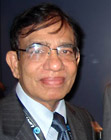
ARE YOU STROKE SMART?
WHAT YOU NEED TO KNOW FOR PREVENTION – II

1. Dyslipidemia: High total cholesterol with high LDL (bad) and low HDL (good) with or without high triglycerides are major contributory factors not only for heart disease but strokes too. ‘Non-HDL’ cholesterol (Total Cholesterol – HDL ) seems to correlate better with vascular disease. If your total cholesterol is 200 and HDL is 45, then your Non-HDL is 155. Ideal number for prevention is less than 120 and if you already are at high risk or has established vascular disease, the number to shoot for is 100 or less.
Dietary modification (ideally low to medium carb with low fat) along with wonder drug ‘statins’ such as Lipitor or Crestor and daily exercise would go a long way in dealing with this problem. Another measurement is the ratio of apolipoprotein B to A1 ; lipoproteins are the carrier proteins, which transport cholesterol in the blood. Your doctor can explain more about these sophisticated tests.
2. Regular physical activity: Exercise promotes blood flow throughout the body and hence maintains the integrity of the internal organs. Regular physical activity is enormously helpful in preventing heart attacks and strokes, especially in women. It may help to open up new collateral channels in the heart and other organs too. It is known to boost HDL cholesterol, lower LDL cholesterol and protects the inner layer of blood vessel walls, called the endothelium, from getting stiff. It reduces inflammation throughout the body and mitigates against “Endothelial dysfunction” (when blood vessel linings no longer dilate to accommodate increased blood flow) that often sets the stage for atherosclerosis, eventually leading to heart attacks and strokes.
3. Alcohol intake: You have heard or read articles that moderate amount of drinking alcohol is good for your general health. But first we have to define what is “moderate.” Strictly speaking, one 4-ounce glass of red wine for females and no more than 8 ounces for males are the recommended amount. Yes, it may increase your HDL some and could be protective against strokes. The truth is that the amount of alcohol that can protect you from stroke is still controversial, mainly because alcohol can also have the opposite effect and actually increases your risk of stroke.
Several experimental and epidemiological studies have shown that heavy alcohol consumption definitely increases the relative risk of stroke. Alcohol might contribute to stroke in several ways: “Induction of cardiac arrhythmias and cardiac wall motion abnormalities which predispose to cerebral embolism, induction of hypertension, enhancement of platelet aggregation and activation of the clotting cascade, and reduction of cerebral blood flow by stimulation of cerebral vascular smooth muscle contraction or by altering cerebral metabolism.” More than 30 alcoholic drinks per month or binge drinking vs. no alcohol use appear to increase the risk for all types of strokes.
4. Psychosocial stress and depression have been linked to an increased risk for all causes of stroke. Stress has become all too common these days as we struggle with so many daily issues in our lives related to ‘job situation, personal finances, family tensions or health problems and more.” Physiologically, when your body is under stress, the sympathetic nervous system is stimulated and there is an outpouring of many unwanted hormones and other molecules like adrenalin, cytokines, etc. This in turn stimulates your immune system triggering inflammation and other unwanted effects. Stressful jobs have been shown to have a direct biological impact on the body. So, go ahead and take the necessary steps to de-stress your life.
Now you know how to prevent strokes; all you need to do is start practicing these measures. The first steps are always difficult to take but you need to overcome that inertia and get going. Be compliant with your doctors’ orders and take medicines without fail. When you see your children, grandchildren and even great-grandchildren growing up, you will tell yourself, “it has all been worth it.”
This concludes the series on ‘strokes.’
Dr. M.P. Ravindra Nathan is a Brooksville cardiologist and director of the Hernando Heart Clinic.